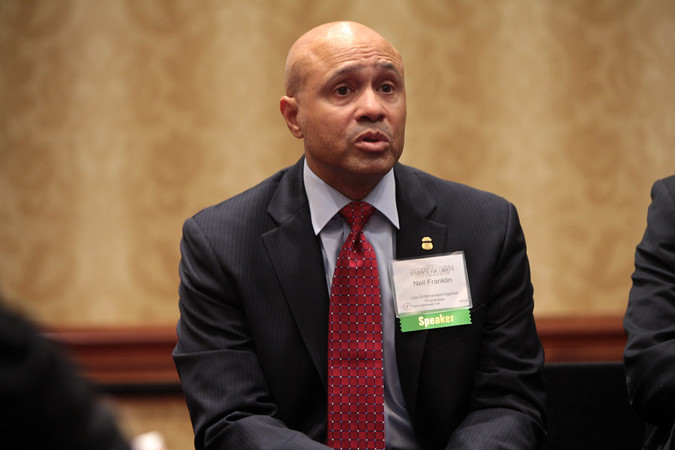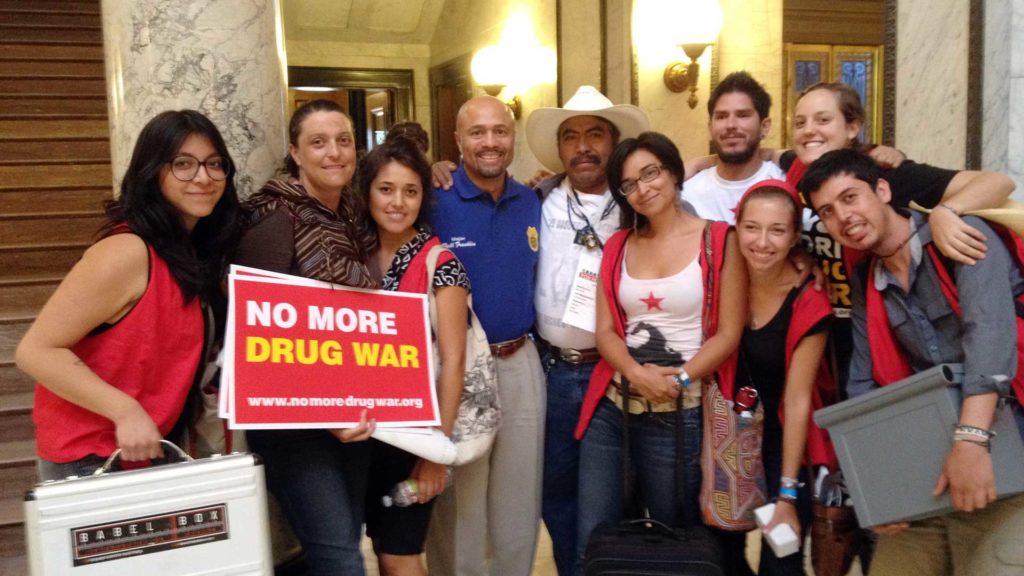An interview with LEAP Executive Director, Neill Franklin
Neill Franklin is the Executive Director of the Law Enforcement Action Partnership (LEAP). Before joining LEAP, Neill spent 34 years at the Maryland State Police and the Baltimore Police Department.

Psymposia is a 501(c)(3) nonprofit research and media organization that offers critical perspectives on drugs, politics, and culture. We rely on contributions from our readers and listeners. Your support is vital to sustaining Psymposia.
Support Psymposia’s independent journalism on Patreon and help us drive the Mystery Machine! We’re a bunch of meddling kids who are unmasking the latest shenanigans on the psychedelics beat.
Neill Franklin is the Executive Director of the LEAP, Law Enforcement Action Partnership (formerly Law Enforcement Against Prohibition). Before joining LEAP, Neill spent 34 years at the Maryland State Police and the Baltimore Police Department. Now he’s dedicated to making communities safer by confronting issues of drug policy and criminal justice reform
Tell us about the newly re-launched LEAP
In a nutshell, the re-launch of LEAP as Law Enforcement Action Partnership is about positioning ourselves to do a better job of connecting the war-on-drugs dots for people. By talking about the many byproducts of the war on drugs (over incarceration, civil forfeiture, police militarization, poor police community relations, overdose deaths, immigration, etc.), we can paint a correlation for people. This reformation also creates an atmosphere for increased recruitment of more law enforcement professionals, which is an absolute must for communicating our message. As cops educate more cops and prosecutors educate more prosecutors, the sooner the madness ends.
Why did you join the police?
My older brother became a state trooper while I was still in high school. Seeing the job through his experiences seemed interesting, so I gave it a shot.
What’s a day in the life like for a major investigating narcotics in the Maryland State Police?
Well, as a major you don’t do much investigating. I was the northeast regional commander for nine drug task forces. Now, when I was a narc back in 1980, that was a different story. Hanging out at bars and other places befriending people for the purpose of hooking an unsuspecting pot user. Once you hook someone for smoking a little weed, you put the screws to them and get them to rat on someone else. So much for the golden rule.
How many drug busts did you do a week on average?
It wasn’t like what you see in cities like Baltimore today, sweeping corners in drug dragnets. Our cases took much more time and effort in the 80s. Although I don’t agree with our drug prohibition laws, my arrests back then were solid arrests, never violating anyone’s constitutional rights and never losing a case in court. So, to get to your question, only one or two.
Many people are surprised when they first hear about civil asset forfeiture. What was it originally intended to do? How has asset forfeiture been abused since its inception?
Yes they are surprised. There are two types of people when it comes to civil forfeiture: those who hate it and those who don’t know what it is. The intent of civil forfeiture policy of the 1980s was to go after the illegal profits of major drug dealers and kingpins. After we took down the major community dealers, we turned these policies loose upon the unsuspecting small-time drug user and the innocent traveler carrying cash.
What’s the biggest abuse you’ve seen in civil asset forfeiture?
Personally, the biggest abuse I’ve seen was on the eastern shore of Maryland. We would seize the cars of “suspected” low-level dealers and sell them back for a few hundred dollars when they begged for it, needing their car for commuting to and from work. For those who could not recover their cars and motorcycles, the Salisbury Chief of Police was selling them to his friends at greatly reduced rates. This did not end well for him.

What do most police officers really think about the war on drugs?
Eighty plus percent of police chiefs admit that the war on drugs has failed, but as a chief, you must tow the mayor’s party line of prohibition. Even though they believe that the WOD has failed, most do not support legalization of all drugs. I believe that maybe half support legalizing marijuana. Most of the men and women on the street get it. They see the damage done first hand on many levels.
If you could say one thing to police officers who are true believers of prohibition, what would it be?
It would be a question or two. What are the positive aspects of the war on drugs? Are there fewer drugs available to kids? Has violent crime been greatly reduced? Have we experienced a decline in overdose deaths? Is it saving the country money? Think about it!
Michael Wood talks about the “police problem” as a management problem. You’ve talked about the need to change police incentives. Tell us about that.
The performance problems of employees in any profession are owned by management. Hire the best people for the job, train them as best as you can, lead from the front, hold folks accountable, and fire them when they don’t measure up. It’s not rocket science. As for incentives, establish the right metrics. Use a metric of the absence of crime, not the evidence of crime. Arrest numbers (quotas) should never be a metric of success.
How much money a year can a police officer make in overtime from investigating small-scale drug crimes? Is this one of those incentives that needs to be changed?
This should be changed. Not just for drugs, but all arrests should be turned over to the oncoming shift. It’s very easy to almost double your pay in many departments by making drug and other low-level arrests.
Are you seeing more police chiefs come around on prohibition and the war on drugs?
Very slowly because of politics as mentioned above.
Can you comment on violent crimes going unsolved because the police are too busy focused on small-scale drug sales?
Nationally in the late 60s, we solved 90 percent of all murders. Today that number is 60 percent. We have experienced a similar decline with rape, robberies, and burglaries. Today, 40 percent of murders go unsolved, along with 60 percent of rapes and 75 percent of robberies. This drastic change came about when we began the war on drugs in the early 70s.
What are the problems associated with decriminalization, and why do you support legalization instead? What are the potential problems you see associated with legalization?
Decriminalization, ending criminal penalties for possession only, leaves the violent illicit trade in tact. Kids are still recruited by drug dealing gangs and crews, and adulterated products continue being sold because there are no quality control standards. As for legalization, whatever problems you see in the alcohol industry are potential problems for any legal drug market, and they would vary in line with policy differences.
When I mention legalization for all drugs to someone, they generally laugh and shake their head and say something like “OK so you think heroin should be available to anyone?” Comment on this. What’s your most convincing argument for why drugs should be legalized?
First, heroin should not be available to everyone. It should not be available to kids. My argument is to end the prohibition of consensual adult behavior because prohibition causes more societal harm than drug use ever could. Prohibition has failed with every consensual adult behavior: tobacco, coffee, alcohol, sex, etc. Prohibition policies have transformed the land of the free into the world’s number one incarcerator. It has made our communities extremely violent, and it is responsible for the growth of violent gangs that recruit our children. It is responsible for highly potent drugs flooding our communities causing high overdose death rates. And it is responsible for the rift between police and poor black communities. By the way, it has cost us more than 1.5 trillion dollars over the past five decades.
If heroin, cocaine, meth, etc. were legalized overnight, what would that regulated system look like?
It could be a number of things. The best I can recommend for you is this book of many possibilities. Read the summary.
In your opinion, as a country, what do we do about cartel trafficking and abuse associated with pill culture and the over-prescription of painkillers? Can it be prevented? If so, what’s the most effective way?
End prohibition, and the cartels go away. The pill culture, alcohol, tobacco, etc. is all about education and health. The number one contributor to drug abuse is mental health in nature. Educate kids and treat mental illness.
How could we put money spent fighting the war on drugs to better use?
See my prior answer, education and mental health. We can also rebuild the poor communities that have been devastated by the war on drugs. We spend billions rebuilding other countries after a war, now it’s our turn.
What motivated you to defect sides in the drug war?
Education. True education begins at the moment you realize the vastness of your ignorance.
I woke up to the carnage of competing gangs due to the amount of money available. I learned that it was all because of prohibition policies, which made drugs more valuable than gold. I want the killings to stop. That’s my main motivator.
What’s the worst thing you saw as a police officer?
The abuse of kids. From assaults to sexual abuse to neglect, kids cannot defend themselves, relying 100 percent upon others to protect and provide for them. That’s where we, the police, should be focusing our limited resources, protecting the children.
If you had the power to remake the criminal justice system, what would it look like?
We wouldn’t need one. We would embrace restorative justice models. Our criminal justice system has done more damage to families than any other policy. As such, when you dissect the family unit, you create unhealthy neighborhoods and communities. When families are intact, communities are healthy and they work. As such, so would restorative justice models. No prisons, only health-based systems for dealing with mental health concerns. When folks act out or up, the community holds them responsible in ways that do not involve incarceration, and there is a process where they actually learn from their negative behavior, always being encouraged to be better citizens. I know, it’s quite idealistic, but you must always strive for what others believe to be impossible.
What can we do today to make positive steps toward this vision?
Just believe that it can be done.
Hey! Before you go… Psymposia is a 501(c)(3) non-profit media organization that offers critical perspectives on drugs, politics, and culture. We strive to ask challenging questions, and we’re committed to independent reporting, critical analysis, and holding those who wield power accountable.
Our perspectives are informed by critical analysis of the systemic crises of capitalism that have directly contributed to the unmitigated growth of addiction, depression, suicide, and the unraveling of our social relations. The same economic elite and powerful corporate interests who have profited from causing these problems are now proposing “solutions”—solutions which both line their pockets and mask the necessity of structural change.
In order for us to keep unpacking these issues and informing our audience, we need your continuing support. You can sustain Psymposia by becoming a supporter for as little as $2 a month.





